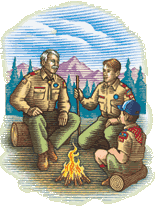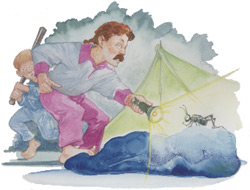![]() October 1999
October 1999

Edited by Jon C. Halter
Illustration by Joel Snyder

Many of the boys in my first-year Webelos den were from urban homes, and an overnight camp-out in a rural location was full of surprises at night - especially for me!
On one such outing, I was awakened at about 3 a.m. by the call of "Mr. Lee! Mr. Lee! Something's in my tent!" We had earlier routed three large snakes from the campsite, so I anticipated the worst. My feelings of dismay were heightened when I saw that the frightened camper was one of our bigger boys. He was standing outside his tent, a large stick in one hand and flashlight in the other.
Before entering his tent, I asked what the intruder looked like. "It's little, but it's got two big, long stingers, and it's in my sleeping bag," the frightened boy replied.
Relieved to know it wasn't a snake, I nevertheless entered cautiously, and gingerly folded back a corner of the sleeping bag.
The "killer bug" emerged - a harmless cricket. Its long legs had been mistaken for venom-filled "stingers of death."
Gary E. Lee
Cubmaster, Pack 22
Charleston, S.C.
Of all the camping I have done since becoming a Boy Scout, I still remember my first Scoutmaster, Curly Verville, taking us to Ottawa Lake in the Hiawatha National Forest, in the Upper Peninsula of Michigan. It was in the springtime, and I remember how cold my feet got. Sleeping bags weren't made for warmth back then.
I remember using my 30-in-1 knife to open a can of soup for lunch ... the Scoutmaster's oldest son, a Sea Scout, coming out to camp and talking to us about the Sea Scouts and then watching them sail their boat on the lake ... sitting around the campfire and hearing ghost stories and the tales of the crazed man with the hooked hand running around loose in the woods. And I remember sleeping in a Baker tent, with no floor, and the flaps propped open - it was more like sleeping in a lean-to.
Scouts remember getting out and doing things. They remember going camping, hiking, getting out-of-doors. They don't remember sitting inside of a building on a weeknight with nothing to do except listen to the Scoutmaster talk about how great the Scouting program is.
If you as a leader want to make a difference in a young man's life, put "outing" back in "Scouting." Get to summer camp, go on weekend outings. Enjoy the Scouting program; it was made for the youth.
Kurt Carlson
District Executive, Shiawassee District
Tall Pine Council, Flint, Mich.
(Adapted from the DE's Corner column in the council newsletter, the Counciline.)
At camp last summer, I realized that at least two of our Scouts hadn't been out in the country often, nor had they received much exposure to rural sights and sounds.
Returning to our campsite early one evening, I heard one of the newest Scouts tell another boy that he was certain someone was "out there" running around on a dirt bike. Asked how he could tell, he simply replied, "Listen."
I did - but all I could hear was the distant "moo, moo" of cattle.
I tried not to laugh, not wanting to embarrass the Scout in front of his friends. And it was even funnier when the other new Scouts agreed that the sounds must be from a dirt bike.
Which just goes to show that we need to get Scouts out as often as possible.
Mike Esposito
Committee Chairman, Troop 392
Grove City, Ohio
The following is an excerpt from a recent "interview" by reporter "Ace Cooper" of 101-year-old "Scott Masters," the "oldest known Scout in the Tecumseh Council":
Q: How has Scouting changed over the years?
SM: It has gotten easier and softer on the boys. Back when I was a Scout, things were tougher. For one thing, we had to earn 100 merit badges, and since we couldn't afford a needle and thread, we had to beat them on to our body with rocks until they stayed put.
Merit badges were harder to earn, too. The hard ones - like Advanced Underground Sulphur Mining, Poison Snake Handling, and Broken Glass Collecting - were all removed because of so-called "dangers."
Camp-outs were not easy either. It was colder then, so it snowed every camping trip, and we had to sleep under piles of rotting leaves because we could not afford tents and sleeping bags.
And supper was a pile of sticks and rocks, along with a squirrel tail in a pot of water warmed over the fire. It wasn't much, but we were thankful because it was better than what we ate at home. ...
Adapted from the Chillicothe District page in the February 1999 issue of The Totem, newsletter of the Springfield, Ohio-based Tecumseh Council
Before my den visited the local police station, we made a thank-you gift for the officer who would be our guide. From a piece of pine, we cut a large star and sanded the edges. I wood-burned a big "Thank You" across the middle with the date and our den and pack number, and each Cub Scout carefully burned in his name.
On the day of our visit, we baked a plate of cookies, which we wrapped together with the thank-you plaque in aluminum foil.
During the tour, our guide would smile and eye what was obviously - even wrapped in foil - a plate of cookies. At the end, we gave him the cookies and then surprised him with the star plaque (which had been concealed by the plate).
This wonderful, patient officer, with tears in his eyes, then thanked my den. He said he had been giving tours to Scouts and other groups for many years and had never met anyone who went to "such extremes" to thank him for his time and help.
We had prepared our special thank-you project in one meeting. But the memory of the officer's gratitude will stay with those Cub Scouts for a long, long time.
Sheree J. Donaldson
Unit Commissioner, Pack 243
Frederick, Md.
On their first day of Navy boot camp, Will (who was my first Eagle Scout) and about 80 other new recruits were greeted by the drill instructor. After getting everyone into a straight line and at attention, the instructor announced that he was going to find the group their leader for the duration of training camp.
"All those who were in Boy Scouts ... take two steps forward," he ordered. At this command, about 30 men stepped forward.
"Now, of this group, everyone who is an Eagle Scout take two steps forward." When Will was the only one to respond to the second command, the instructor declared, "You are the platoon leader."
At the end of training camp, the men were assigned to duty locations all over the world. Because of extra points earned for his leadership as the platoon leader, Will was allowed to choose his destination.
For the next four years he was stationed in Honolulu, Hawaii.
Kent M. Marks
Scoutmaster, Troop 56
Painesville, Ohio
| The Boy Scouts of America | http://www.scouting.org |